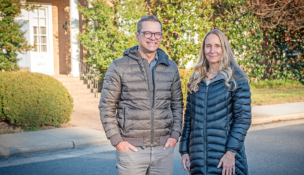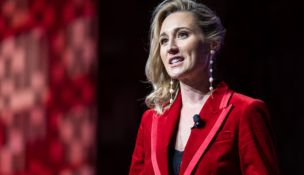
Kyle Johnson (R) and Mari Soonsoo Bae refined the idea for their business, Ara Platforms, through a Startup Virginia incubator program. Photo by Matthew R.O. Brown

Kyle Johnson (R) and Mari Soonsoo Bae refined the idea for their business, Ara Platforms, through a Startup Virginia incubator program. Photo by Matthew R.O. Brown
Incubators help entrepreneurs determine viability
Jenny Boone //June 1, 2025//
SUMMARY:
- Startup incubators across the state help entrepreneurs determine whether their business plans are viable.
- Through these programs, entrepreneurs test and refine business ideas and gather customer feedback.
- Entrepreneurs with viable ideas often move on to accelerators for next steps.
Richmond husband-and-wife tech entrepreneurs Kyle Johnson and Mari Soonsoo Bae were on a path to creating their first business together. Johnson’s technology and AI acumen and Bae’s business school knowledge were the perfect pairing.
But it wasn’t until they joined the Idea Factory, a program developed by Richmond-based business incubator Startup Virginia, last year that their venture began to take full shape.
Once the couple started asking questions and gathering feedback from potential customers, they saw the problem that they needed to solve, as well as the solution: Data analyst teams across corporate America needed a central place to store, organize and share data with many sources. That’s what their business, Ara Platforms, provides.
“It was constantly interviewing and really learning to leverage your network,” Johnson says. “That really helped me snap out of some of my own biases. You can start to fall in love with your ideas. You can start to think that if it works in my head, people will buy it.”
Startup incubators abound in Virginia, but for early-stage entrepreneurs, programs that help determine whether their business plans are viable are often valuable — even when the answer is “no.” Here’s a sample of incubators across the state that aim to answer that question.
Idea Factory is a seven-week cohort program that brings aspiring entrepreneurs representing a variety of industries together to develop and test their business ideas. The process is called customer discovery, which involves gathering feedback from people to find out if there is a target audience and a need for a business idea and who and what that audience is.
“It’s the watermark behind your business,” says Kip Hart, startup engagement manager for Startup Virginia, which supports entrepreneurs and business growth in Central Virginia.
“If we can help them focus on their target market, then the effectiveness of their marketing and development of their product will be much higher,” he says. “Our tagline is, ‘Why not build a business on insights instead of assumptions?’”
Through the Idea Factory, entrepreneurs create a list of 100 potential customers and then choose 12 to interview. They ask questions that key in on how or if their business idea solves a real problem. A survey with feedback from potential customers also gives entrepreneurs useful data.
At the end of the program, entrepreneurs learn whether the idea has a solution, but customers don’t buy it; whether they should proceed cautiously and consider changing the idea’s direction; or whether the venture is viable, says Hart.
Viable businesses typically are invited to continue with Startup Virginia’s incubator, which focuses on high-growth, scalable ventures.
Not every entrepreneur’s idea pans out, but Hart says all discoveries are important revelations.
“You may realize that you don’t want to be in this startup world,” he says. “That is positive. It saves you time and energy. You may learn you don’t want to be a founder but [still] love the startup ecosystem. You may explore opportunities within the startup world.”
Business Bootcamp, part of Staunton’s Shenandoah Community Capital Fund, has a similar philosophy. During the eight-session program, aspiring entrepreneurs learn to identify target customers, define a problem their venture can solve, establish business and marketing plans, and more.
The bootcamp also asks participants to survey potential buyers during the customer discovery process and encourages them to go beyond their personal contacts.
“We really stress to get outside of your friend group,” says Ryan Hall, SCCF’s executive director. “It is pretty incredible how many people think they have a good product and never ask anybody else or collect data.”
At the end of the eight weeks, some may realize that their startup idea is not feasible, Hall says: “That’s a win for us. We have given them the ability to see that.”
In Roanoke, a business incubator with a focus on building high-growth IT, health care and life science companies also offers a pre-accelerator program dubbed On RAMP. Held by the Regional Accelerator and Mentoring Program (RAMP), the program lets entrepreneurs test their ideas through customer discovery with guidance from business experts.
So far, about half of the entrepreneurs in the On RAMP program have feasible business ideas that are in development stages, says John Hagy, RAMP’s director. The goal, he says, is for most participants to move into the RAMP In Residence program, the next stage.
Meanwhile, as Johnson and Bae continue to build Ara, Startup Virginia remains an important resource for them. The couple meet regularly with mentors and other colleagues involved with the incubator. With the incubator team, Bae also has practiced business pitches for potential investors.
“I really believe that we found a very fruitful problem to solve,” Bae says. “I know that so many people who work in corporate America experience the same problems and the same frustrations. We want to solve that pain.”
i


















